Children Changing the World
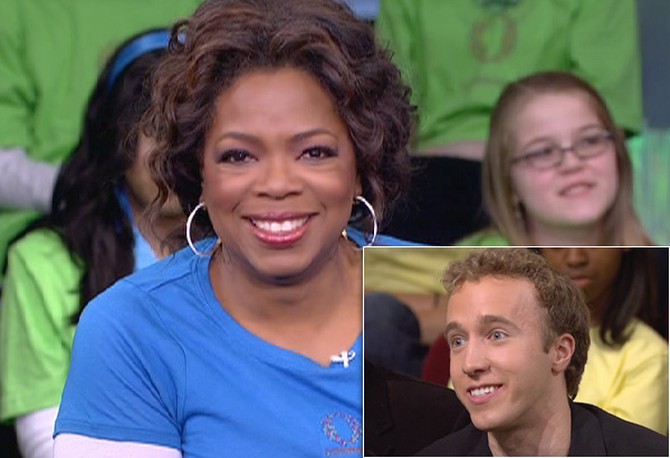
When Craig Kielburger first appeared on The Oprah Show in 1999, he was a 16-year-old social activist on a mission to show young people they have the power to change the world. Since that day, Oprah's Angel Network has teamed up with Craig's organization, Free The Children, and built almost 60 schools in underdeveloped countries around the world.
"We've set up groups in schools across North America. They apply and receive a curriculum about different issues facing the world—from environment to health to sustainability. Then, the students take actions from fundraisers to awareness raisers, and some of them even go overseas and volunteer," Craig says. "We're launching a challenge to a generation of kids to change the world."
"We've set up groups in schools across North America. They apply and receive a curriculum about different issues facing the world—from environment to health to sustainability. Then, the students take actions from fundraisers to awareness raisers, and some of them even go overseas and volunteer," Craig says. "We're launching a challenge to a generation of kids to change the world."
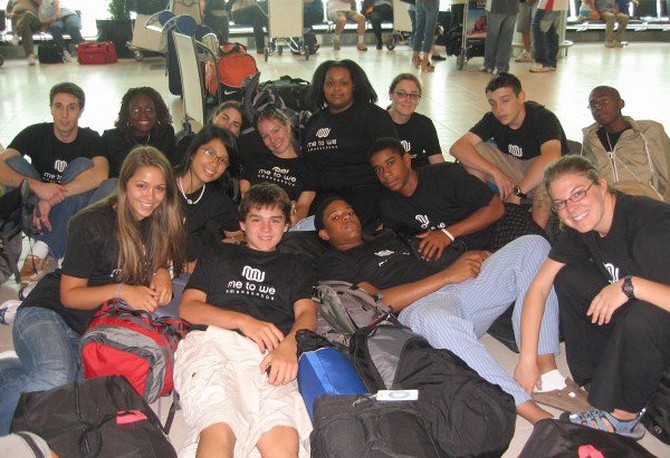
The inaugural group of O Ambassadors is comprised of 12 students from diverse backgrounds across North America. The members include Jeremie, from the South Side of Chicago; Mary, who moved to Queens, New York, from a farm in the Philippines at age 6; Shannon, who has been supporting herself in a tough Toronto neighborhood since she was 16; and Ola, from New Jersey, whose parents were born and raised in Nigeria.
When the group learned that they could build a school in Kenya for about $8,500, they launched fundraisers from dodgeball tournaments to school carnivals to kissing booths, eventually raising the money and heading to Africa to get to work.
See what happened when the O Ambassadors arrived in Africa.
For the 12 Ambassadors, the three-week trip to Kenya was a life-changing experience. Andrew is a member of the group who says that before he went to Africa, he didn't know what he wanted to do with his life. "I didn't really understand the world outside of America. But after I came back, I was fired up. I was really interested in development. Since then, I have been trying to learn as much as I can about Africa and the developing world, and I think it's a career I want to pursue," he says. "But more than anything, it unlocked a passion in me to change the world that I never knew I had."
When the group learned that they could build a school in Kenya for about $8,500, they launched fundraisers from dodgeball tournaments to school carnivals to kissing booths, eventually raising the money and heading to Africa to get to work.
See what happened when the O Ambassadors arrived in Africa.
For the 12 Ambassadors, the three-week trip to Kenya was a life-changing experience. Andrew is a member of the group who says that before he went to Africa, he didn't know what he wanted to do with his life. "I didn't really understand the world outside of America. But after I came back, I was fired up. I was really interested in development. Since then, I have been trying to learn as much as I can about Africa and the developing world, and I think it's a career I want to pursue," he says. "But more than anything, it unlocked a passion in me to change the world that I never knew I had."
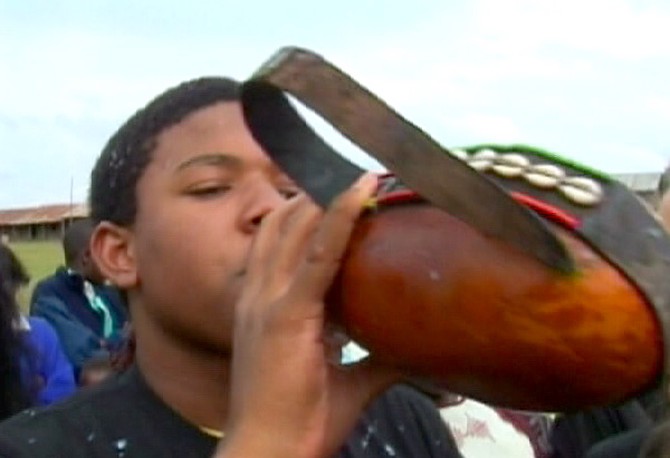
For a group of students from North America, African rituals can create a bit of culture shock. Before the O Ambassadors could begin building in the Kenyan village of Elerai, the locals performed a goat sacrifice to bless the land on which the school would reside. "A goat is like money—they're very valuable, so it was a big deal for them to do this," Ola says.
Despite recognizing the significance of the goat sacrifice, the students still had a hard time watching the ritual. And when a Maasai warrior passed around a gourd filled with goat's milk in preparation for the sacrifice, only team member Ryan actually drank it.
Another morning, the group was woken up by Nbala, a Maasai warrior who took them on a hike to see how the people of Elerai live.
Watch as the O Ambassadors get immersed in Kenyan culture.
Despite recognizing the significance of the goat sacrifice, the students still had a hard time watching the ritual. And when a Maasai warrior passed around a gourd filled with goat's milk in preparation for the sacrifice, only team member Ryan actually drank it.
Another morning, the group was woken up by Nbala, a Maasai warrior who took them on a hike to see how the people of Elerai live.
Watch as the O Ambassadors get immersed in Kenyan culture.
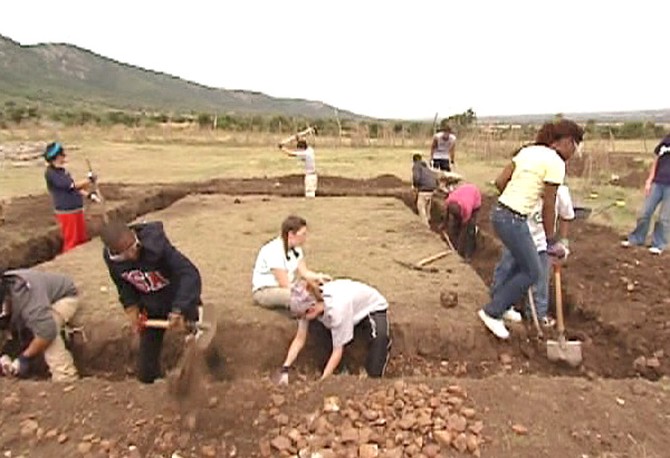
How do 12 teenagers build a school with their own hands in only three weeks? To start, they got only a 30-minute construction lesson. Then, with the help of Free The Children leaders and other community members, it was off to work. "It was kind of scary to think, 'We don't have anything but what we were taught in the last half-hour,'" Andrew says. "I kept wondering, 'Wouldn't it be a good idea to invest in a tractor?'"
Haley says she was in disbelief. "We were 12 kids, and we were supposed to build from scratch with picks and shovels and wheelbarrows? I literally said, 'This is a joke.'"
But as time passed, the project got easier, and it soon became clear that the Ambassadors would get the job done. "If we came all the way to Kenya to build a school and we didn't finish building it, I'd be so disappointed in myself," Ryan says.
Craig says the project came together because the students worked side by side with members of the community. "Mamas from the community were helping, fathers left their fields, even kids who wanted to go to the school," he says. "Every single day, laying bricks and seeing those walls rise and eventually hoisting up the roof."
Haley says she was in disbelief. "We were 12 kids, and we were supposed to build from scratch with picks and shovels and wheelbarrows? I literally said, 'This is a joke.'"
But as time passed, the project got easier, and it soon became clear that the Ambassadors would get the job done. "If we came all the way to Kenya to build a school and we didn't finish building it, I'd be so disappointed in myself," Ryan says.
Craig says the project came together because the students worked side by side with members of the community. "Mamas from the community were helping, fathers left their fields, even kids who wanted to go to the school," he says. "Every single day, laying bricks and seeing those walls rise and eventually hoisting up the roof."
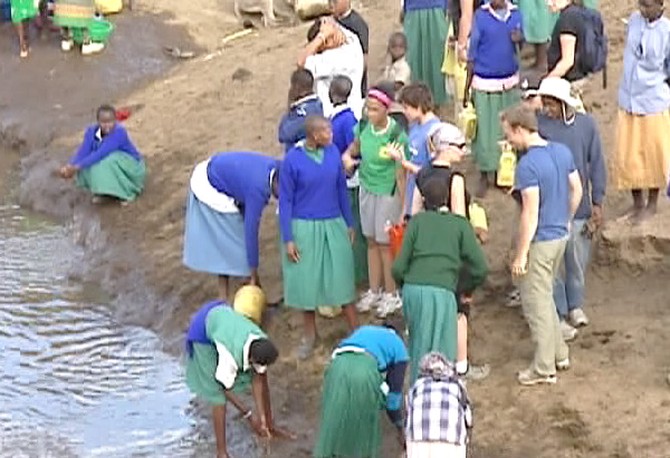
To see what life was really like for African children, the O Ambassadors decided to walk in their shoes and help with daily chores. First on their to-do list was goat herding. Even with all of the teens working together, they spent most of their time chasing crafty runaways into bushes and cactus plants. "Five-year-olds do this, and they do it all the time every day, and the goats don't get lost and run away," O Ambassador Lia says.
Watch their attempts to round up the goats.
Because there is no well nearby, children from the village must make water runs to the nearest source for their family's drinking, cooking and bathing needs. The O Ambassadors accompanied a group of local girls to the nearest water hole—an hour away. What they saw shocked them. "It didn't look like a river," Robert says. "It was dirt because that's the same river that people bathe in. They take their animals there."
See the conditions of the river.
The O Ambassadors quickly learned there are no other options for drinking water in the area. "At home, you turn on your tap, you have clean water openly available to you," Shannon says. "And then you go there and you see that, and you look to your left and there's cow dung there. And then I saw a girl actually step in it, rinse her foot off in the river, and then drink from it right afterward. And I just wanted to stop her and say, 'No, please, don't.'"
The O Ambassadors shared their clean water with the kids, but they decided something more needed to be done. When they returned from their trip, they raised enough money to build a well for that community. "It's only $5,000 to build a well in a developing country," Craig says. "It's possible."
Watch their attempts to round up the goats.
Because there is no well nearby, children from the village must make water runs to the nearest source for their family's drinking, cooking and bathing needs. The O Ambassadors accompanied a group of local girls to the nearest water hole—an hour away. What they saw shocked them. "It didn't look like a river," Robert says. "It was dirt because that's the same river that people bathe in. They take their animals there."
See the conditions of the river.
The O Ambassadors quickly learned there are no other options for drinking water in the area. "At home, you turn on your tap, you have clean water openly available to you," Shannon says. "And then you go there and you see that, and you look to your left and there's cow dung there. And then I saw a girl actually step in it, rinse her foot off in the river, and then drink from it right afterward. And I just wanted to stop her and say, 'No, please, don't.'"
The O Ambassadors shared their clean water with the kids, but they decided something more needed to be done. When they returned from their trip, they raised enough money to build a well for that community. "It's only $5,000 to build a well in a developing country," Craig says. "It's possible."
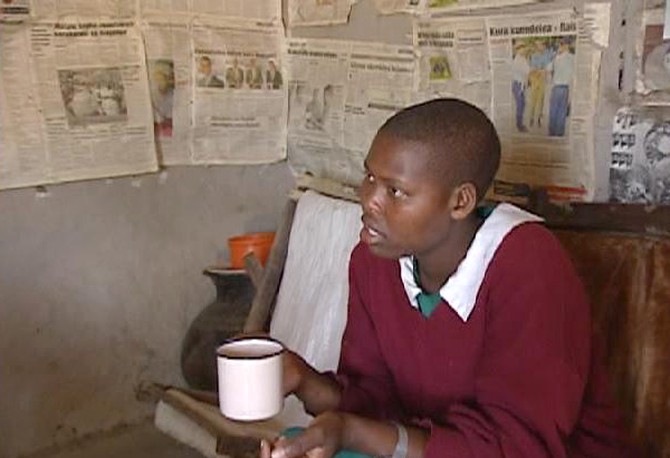
One of the O Ambassadors's favorite days was spent just hanging out with the Kenyan kids and teaching them games like Red Light, Green Light. "They were really good at soccer, so we played a little bit of soccer with them and they just completely whooped us," Andrew says. "But they did ask some weird questions. They were like, 'How many wives do you have?'"
Some of the O Ambassadors also got to see what a Kenyan girl's home was like. "Ukabeth was one of the most relatable, special, genuinely unique girls I met," O Ambassador Haley says. "We all felt so comfortable with each other, just like friends back home."
Ukabeth proudly hangs the newspapers she's read and her completed school workbooks on the walls of her home. "She prays that she can go to school and continue her education, and I think it's just really beautiful," Haley says.
She also shows them her bed and tells them how her family's goats also sleep in the house. Then, Ukabeth serves her guests some chai tea—and shares the best ingredients with everyone. "She's so proud of everything she has," Haley says. "I can really see her making a difference in Kenya."
Despite their differences, everyone took one important lesson away from their time together. "We are all kids no matter where we're from, where we grow up. Every single one of us has the same values and innocence about us," Haley says. "There's no reason for them to be less privileged or different than us."
Some of the O Ambassadors also got to see what a Kenyan girl's home was like. "Ukabeth was one of the most relatable, special, genuinely unique girls I met," O Ambassador Haley says. "We all felt so comfortable with each other, just like friends back home."
Ukabeth proudly hangs the newspapers she's read and her completed school workbooks on the walls of her home. "She prays that she can go to school and continue her education, and I think it's just really beautiful," Haley says.
She also shows them her bed and tells them how her family's goats also sleep in the house. Then, Ukabeth serves her guests some chai tea—and shares the best ingredients with everyone. "She's so proud of everything she has," Haley says. "I can really see her making a difference in Kenya."
Despite their differences, everyone took one important lesson away from their time together. "We are all kids no matter where we're from, where we grow up. Every single one of us has the same values and innocence about us," Haley says. "There's no reason for them to be less privileged or different than us."
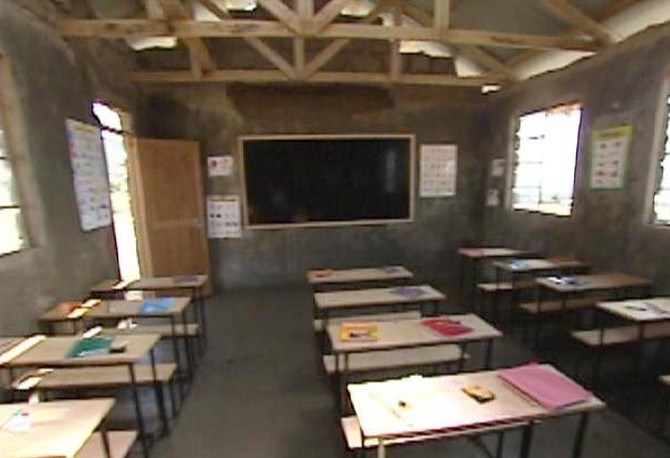
With only three weeks to finish building the school, Ola says it sometimes felt like it would never get done. "But it only made us work harder," she says.
The hard work paid off, and the O Ambassadors were able to present their gift to the community right on schedule.
Watch the school's dedication ceremony.
Andrew says he will never forget the faces of the kids in that village. "Right after we ripped the plastic off of the sign, we all rushed into the school, and all these kids ran in there and just packed, and it was just like this great energy. There was all this hope and happiness," he says.
Thanks to this group of O Ambassadors, 50 kids from the village will be able to get an education. "Their kids are their future, and that's what they're depending on," Ryan says. "I felt like I was changing the future of a whole community. It was amazing. It was one of the greatest experiences of my life."
The hard work paid off, and the O Ambassadors were able to present their gift to the community right on schedule.
Watch the school's dedication ceremony.
Andrew says he will never forget the faces of the kids in that village. "Right after we ripped the plastic off of the sign, we all rushed into the school, and all these kids ran in there and just packed, and it was just like this great energy. There was all this hope and happiness," he says.
Thanks to this group of O Ambassadors, 50 kids from the village will be able to get an education. "Their kids are their future, and that's what they're depending on," Ryan says. "I felt like I was changing the future of a whole community. It was amazing. It was one of the greatest experiences of my life."
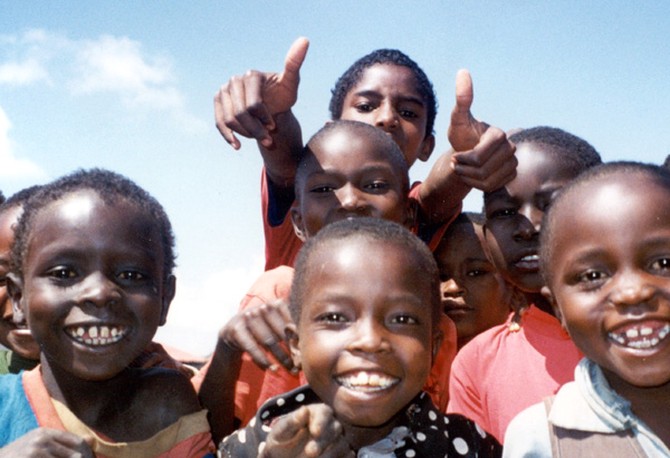
Craig says that new schools make a huge difference in African communities. "Not only are more kids going to school, more girls are going to school, it lowers the rate of female circumcision. It lowers the rate of early marriages," he says. "Studies are showing that it's already turning a high economic benefit, lowering rates of HIV/AIDS."
Still, Craig says there is more work to be done. "There's no magic bullet to end poverty in the world. But if you could, the closest thing to it would be basic primary education," he says. "There are a lot more schools that need to be built in a lot more communities."
Watch more O Ambassadors at work.
Want to support the O Ambassadors program? Make a donation.
Experience part of the O Ambassador's trip for yourself.
Change the world you live in.
Still, Craig says there is more work to be done. "There's no magic bullet to end poverty in the world. But if you could, the closest thing to it would be basic primary education," he says. "There are a lot more schools that need to be built in a lot more communities."
Watch more O Ambassadors at work.
Want to support the O Ambassadors program? Make a donation.
Experience part of the O Ambassador's trip for yourself.
Change the world you live in.
Published 07/10/2008

